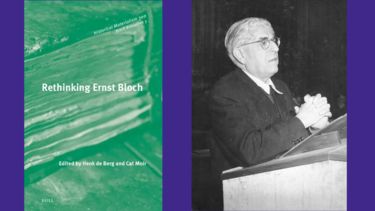Ernst Bloch, a German Jew who fled the Nazis in the 1930s, lived in North America between 1939 and 1948. There, he wrote his most famous work, The Principle of Hope. In 1949, he became a professor of philosophy at the University of Leipzig in communist East Germany, but he opted to settle in the West German city of TÞbingen after the building of the Berlin Wall in 1961. He died in 1977 at the age of 92.
â co-edited with Dr Cat Moir and written by Bloch experts from the US, Australia, Germany, Netherlands and the UK â explores Blochâs life and work, his debt to philosophers such as Karl Marx, and his central concepts of hope and utopia. Above all, it examines the relevance of Blochâs ideas today, in a world still shot through with economic inequality and social injustice.
Among the courses Henk de Berg teaches is the final-year module Modern German Thought, which explores the ideas of some of the most influential German-language thinkers â including Karl Marx, Friedrich Nietzsche, and Sigmund Freud â for our understanding of phenomena such as consumerism, social media, and implicit bias.

